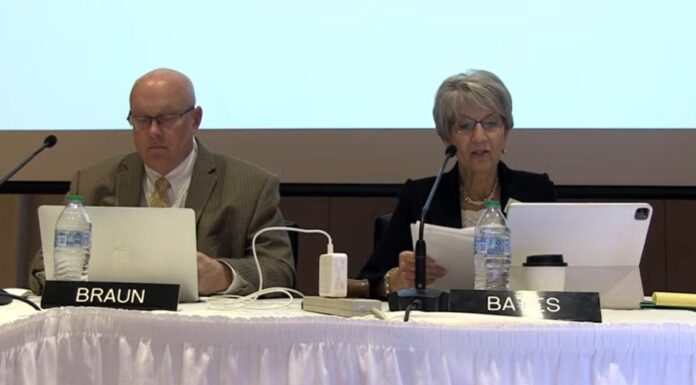Iowa Regent universities are making progress in complying with Senate File 2435, which mandates the elimination of their diversity, equity, and inclusion (DEI) departments, according to a recent update presented to the Iowa Board of Regents Nov. 7. “We will continue to ensure that the universities are monitoring and evaluating their activities in programming to […]
Iowa Regent universities are making progress in complying with Senate File 2435, which mandates the elimination of their diversity, equity, and inclusion (DEI) departments, according to a recent update presented to the Iowa Board of Regents Nov. 7.
“We will continue to ensure that the universities are monitoring and evaluating their activities in programming to ensure ongoing compliance with 261J. Let me be clear, this statute has been adopted by the state, and we will follow the law,” said board president Sherry Bates.
In March 2023, Michael Richards, then-president of the Iowa Board of Regents, appointed a DEI Study Group to conduct a comprehensive review of diversity, equity, and inclusion programs across the state's three Regent universities, ahead of an executive order issued by Governor Kim Reynolds in June.
By May 2024, Gov. Reynolds signed Senate File 2435 into law. Division IX of the bill imposes strict limitations on Regent universities, barring them from creating, maintaining, or funding diversity, equity, and inclusion (DEI) offices or hiring staff specifically for DEI roles. The law, under Iowa Code Chapter 261J, permits DEI-related exceptions only when mandated by legal requirements or specific accreditation standards.
Regent Christine Hensley said prior to the meeting, she met with students who expressed enthusiasm over the directive.
“They are excited about this, and they feel that now it’s open to all the students on the campus,” she said. “I thought that was extremely positive, because I have my one – I wouldn't say caution, but just a little bit sensitive – to the fact that we have changed the makeup of programs and areas, and I just want to make sure that they continue in the direction that everybody has agreed to at this point.”
DEI Study Group gives update on comprehensive review
Regent executive chief academic officer Rachel Boon and board counsel Aimee Claeys, who headed the study group, said the research process for the DEI review followed a structured methodology, guided by four key questions:
- Does the unit or position qualify as a DEI office under Iowa Code 261J?
- Is the unit or position exempt under 2601J?
- If not exempt, does it align with state or federal law or accreditation standards?
- For any remaining units, should adjustments or eliminations be made to ensure compliance?
To support this review, the board office compiled a comprehensive list of applicable state and federal laws, including those related to civil rights, free expression and mandatory training. The team also examined accreditation standards at the institutional, departmental and program levels.
“A lot of the work of our review focused on the programmatic and department college level accreditors,” said Ms. Boon.
'Neutral on politics'
“In my opinion, this report is only a start,” said regent David Barker. “The law is designed to keep university administration out of politics. Professors can conduct research and take controversial ideas wherever they go, but the university itself should be neutral on politics and controversial issues.”
SF 2435 outlines five criteria that define a DEI office or position: Efforts to influence the makeup of the student body or faculty by race, sex, color, or ethnicity; encouraging different treatment based on these factors; policies that refer to race, color, or ethnicity; programs focused on race, color, ethnicity, gender, identity, or sexual orientation; and promoting a widely debated position on specific issues as the university’s official view.
However, certain areas – such as academic departments, student organizations, research funding, and healthcare services – are excluded from this definition, even if they would otherwise meet the DEI criteria.
“There is no justification for the continued existence of any DEI office at our universities,” Mr. Barker said, referring to the report’s lack of evidence for legal or accreditation requirements for such offices.
While laws and standards mandate fairness and non-discrimination, they do not specifically call for DEI offices, he said.
“DEI is defined in the law as any effort to promote differential treatment or to promote certain ideas related to race and other characteristics,” Mr. Barker said, emphasizing that the report presented at the meeting confirmed several DEI offices at the universities have been eliminated. With academic departments and student organizations exempt from the law, the focus is on university administrative offices, and the report suggests that no DEI offices remain on campus, as the remaining offices reviewed were not engaged in DEI activities.
“This is where I believe we have more work to do,” he continued. “Just this semester, there were several examples of university administrative offices that are not being eliminated or restructured that promoted DEI. Promotion of these ideas has been so widespread in university administration that achieving compliance will take a great deal of effort.
“Strategic plans still need to be changed, and our presidents need to strongly communicate that they expect our universities to follow the spirit of the law, not find ways around it. They need to take board directives eight and nine seriously to bring intellectual diversity to campus and fully comply with 261J. If they do not, I believe there will be more legislation next year, in the next legislative session,” he continued.
Compliance will need ongoing review
Regent Robert Cramer asked about the institution's approach to addressing these issues and its plan for maintaining compliance with the law in the long term.
“Governing ongoing trainings, programming activities, that's where the universities have or are in the process of developing internal review structures,” Ms. Claeys said. “Even if an office position or unit is fundamentally exempt from the law or not covered, we still need to pay attention to the discrete programming (of) that unit to assure that the programming continues to be compliant.”
She added that they will continue to work closely with the board office and, when necessary, the attorney general's office to maintain compliance.
Regarding the law's requirement on universities taking official positions on specific topics, she noted that there are plans to propose updates to the board's policy manual to clarify how the institution addresses public matters. Additionally, a new social media policy may be introduced across all campuses.
“We do plan on bringing those changes to the board in February for likely a first and final reading, if it is appropriate at that time,” she said.
Regent Nancy Dunkel pointed out that there was no student representation within the DEI Study Group. “We really need to put our efforts into getting that seat filled so we can hear that perspective as well,” she said.
Regent Jim Lindenmayer expressed broad support for diversity, noting that the concept of diversity – both in thought and perception – is widely accepted as positive.
“I think some of the mistakes that we make as institutional leaders is that we tend to institutionalize those things and put them into boxes and move them forward,” he said. “And it seems to me that politically or wherever this – well, this has come from a political movement in my belief – but that's where the tussle has come in, is that we've institutionalized these things and maybe taking them too far in some instances, maybe not far enough in others … I hope that we don't lose the qualitative piece of the ideas of DEI individually.”
Details on the report can be found
here.




